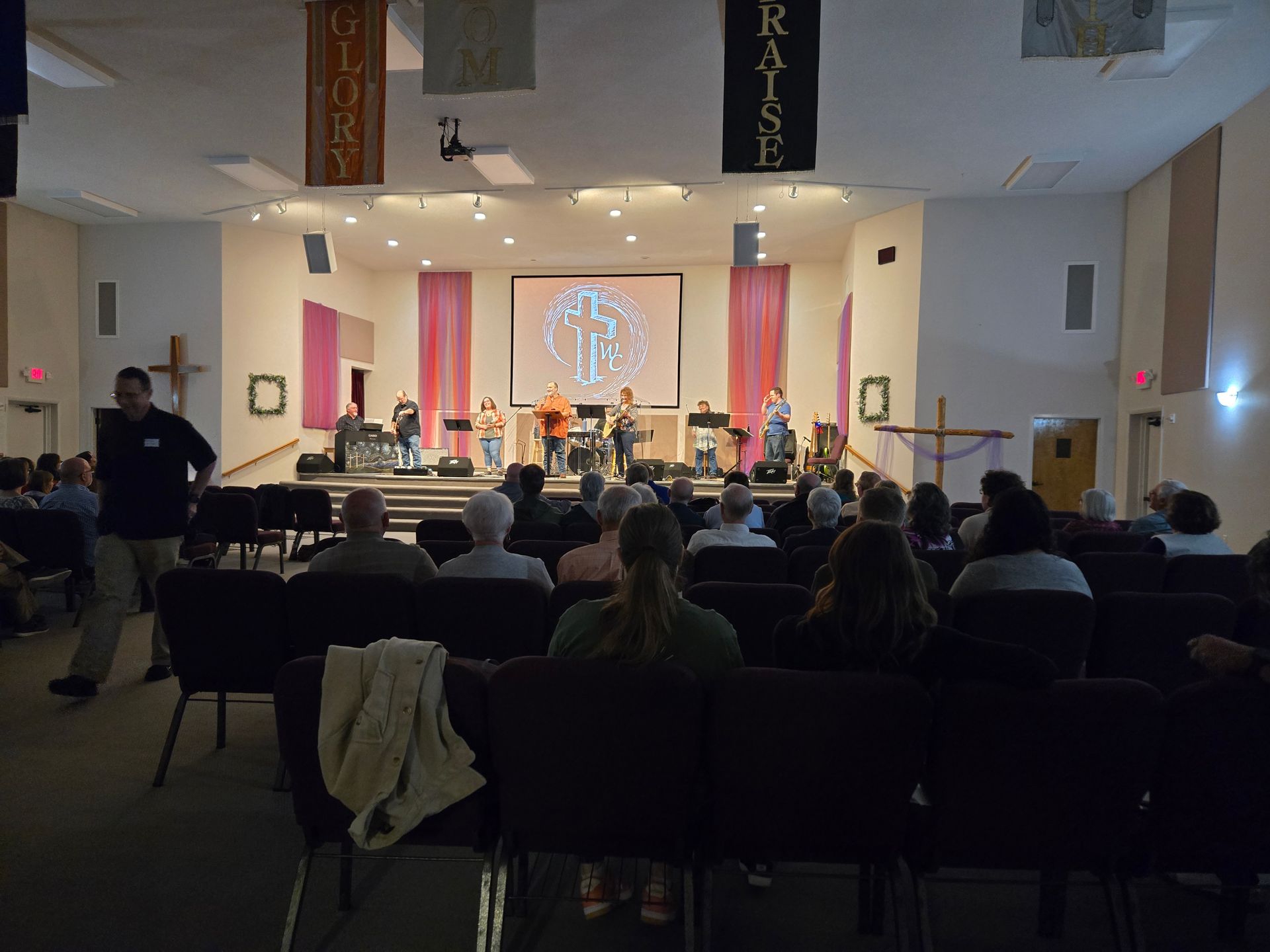"Not at the Dinner Table" Immigration Forum Hosted by Beacon of Hope
“Only 20% of evangelical Christians in the United States say their views on immigration are primarily informed by the Bible,” says Matthew Soerens based on a study conducted by LifeWay.
Soerens spoke at “Not at the Dinner Table,” a forum on refugees and immigration hosted by Beacon of Hope Community Church (the Brethren congregation in Louisville, Ohio) and Pastor Gino Haynes on Saturday, February 11, 2023. Over 50 people attended, one-third of whom were from five Brethren churches in Northeast and Central Ohio.
The event was sponsored by World Relief, the Evangelical Immigration Table, Malone University, and Akron Leadership Foundation and was promoted by the North Central Region of The Brethren Church.
Soerens is the US Director of Church Mobilization for World Relief, a strategic partner with Brethren Relief. World Relief has been instrumental in resettling more than 300,000 refugees since 1979. The Brethren Church has partnered with World Relief, most recently in assisting refugees from the Ukraine war.
Soerens presented information on refugees and immigration, biblical teachings on these topics, and a biblically-informed response. He said 100 million people worldwide are forcibly displaced from their countries, mostly into neighboring nations. Another 50-60 million are displaced within their own countries.
Soerens cited several biblical principles that Christians may draw upon in forming their views regarding refugees and immigrants:
1. Immigrants and refugees are made in the image of God (Genesis 1). Therefore, their lives are valuable and should be protected, and they have the potential to create and contribute.
2. God cares for and loves those who are vulnerable, especially widows, orphans, and foreigners (also translated as aliens, strangers, and sojourners in Deuteronomy 10:17-19 and 92 times in the Old Testament).
3. The Bible teaches us to love our neighbors as we love ourselves (Leviticus 19:18, 33-34). In the Parable of the Good Samaritan (Luke 10:25-37), Jesus taught that the neighbor is the person who loves in a vulnerable way someone who is a foreigner.
4. While Americans highly value safety, the most frequent commands in scripture are “don’t be afraid” and “take courage.”
Two concerns expressed about immigration are the perceived negative impact on the US economy and the fear of criminals entering the country. He referred to a Notre Dame study on economic impact. Refugees who have been in the country for only 2 years do receive more government assistance than they contribute. After 20 years, however, adult refugees average $21,000 more in tax contribution dollars than they consume.
Regarding serious crimes, Soerens reported that since the passage of the Refuge Act of 1980 which has resulted in the resettlement of 3 million refugees in the United States, not one murder of a US citizen has been attributed to a refugee. He also reported that among felony convictions in Texas (the only state that tracks felonies by immigration status), persons unlawfully in the United States commit felonies at a significantly lower percentage than do native-born American citizens.
Soerens said unlawful immigrants come to the United States for many complicated reasons, but most illegals are desperate to find a way to become legal. Unfortunately, under current immigration law, there are very limited ways to do so. There are no laws that require a person to report illegals to the state or federal governments, he said, and it is not illegal to eat with, assist, or worship with undocumented persons, though it is illegal to employ and compensate them. So it is possible to serve them and still remain law-abiding citizens.
He noted throughout his presentation the need for the federal government to secure the border while at the same time advocating for Christians to serve refugees and immigrants already here.
A large percentage of immigrants who seek asylum are suffering persecution because of their Christian faith, so 80% of both lawful and unlawful immigrants entering the United States are Christians – a higher percentage than native-born American citizens. Soerens said these immigrants are helping to revitalize the American church through their passionate faith and love for Christ.
He proposed an acronym based on the word PLEASE as a way for Christians to respond to issues of immigration:
· Pray for refugees and immigrants
· Listen to scripture and to the stories of immigrants themselves
· Encourage Christians abroad who are assisting 70-80% of the refugees in the world, mostly from neighboring countries
· Advocate for refugees as a stewardship responsibility as Christians and as citizens
· Serve the immigrants locally in our midst
· Evangelize the nations that God is bringing into our country, just as we send missionaries to the nations
Following Soerens’ presentation, a panel of persons working locally or nationally discussed practical applications of serving refugees and immigrants. Christy Staats, Evangelical Immigration Table, interviewed Cary Duchett, pastor of Grace Bible Church in rural New Franklin, Ohio, which started and hosts the International Welcome Center of Greater Akron/Canton; Edlyn McGarity, International Welcome Center volunteer; Eileen Wilson, Refugee Ministries Director of The Hope Center for Refugees and Immigrants of Cleveland; and Soerens of World Relief.
At the conclusion, attendees at the forum were given the opportunity to add their names to the Evangelical Statement of Principles for Immigration Reform. They also participated in lunch together, where they heard about ways to be involved locally in ministry among refugees and immigrants.
Links to additional resources on this subject:
Video of the forum on Facebook
“I Was a Stranger . . .” Bible reading challenge
Books on refugees and immigration by Matthew Soerens
World Relief Refugee and Immigrant ministries
Evangelical Immigration Table – the Evangelical Statement of Principles on Immigration Reform appears on this page
The International Welcome Center of Greater Akron/Canton
The Hope Center for Refugees and Immigrants of Cleveland
– reported by Ronald W Waters
















